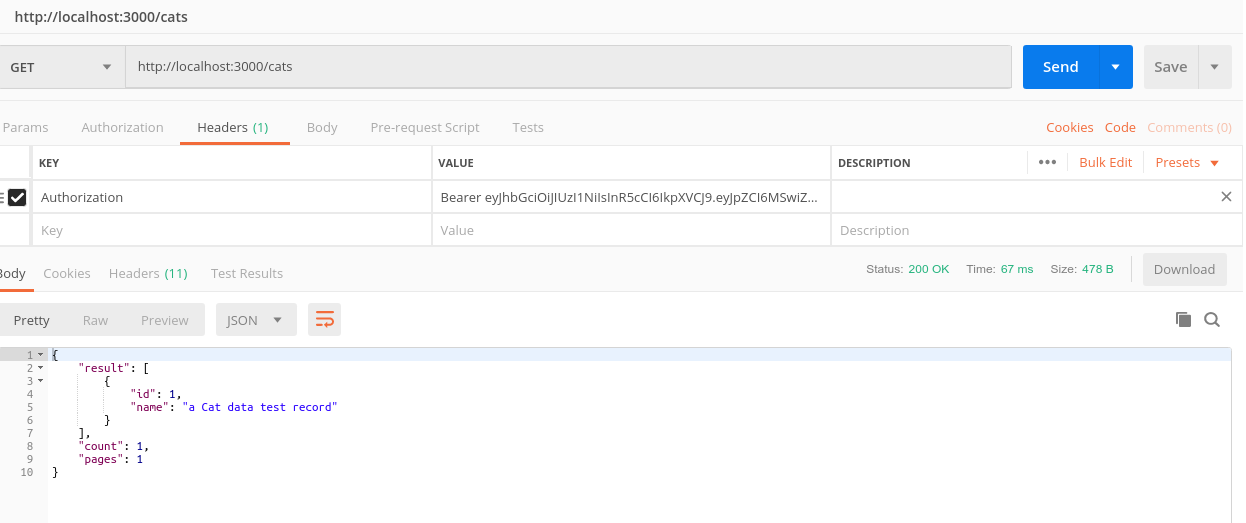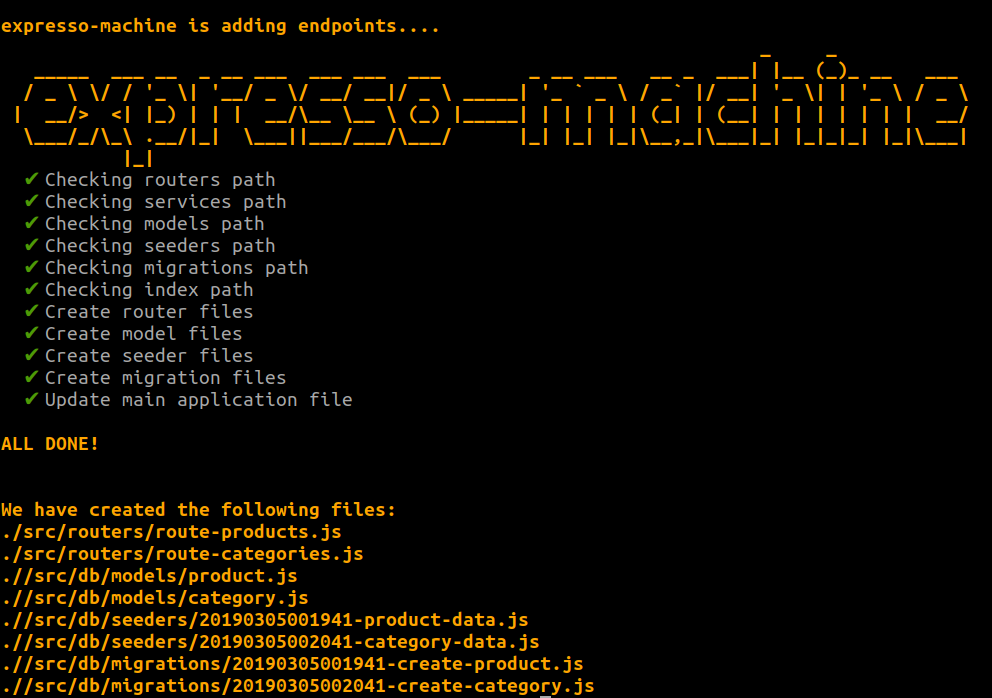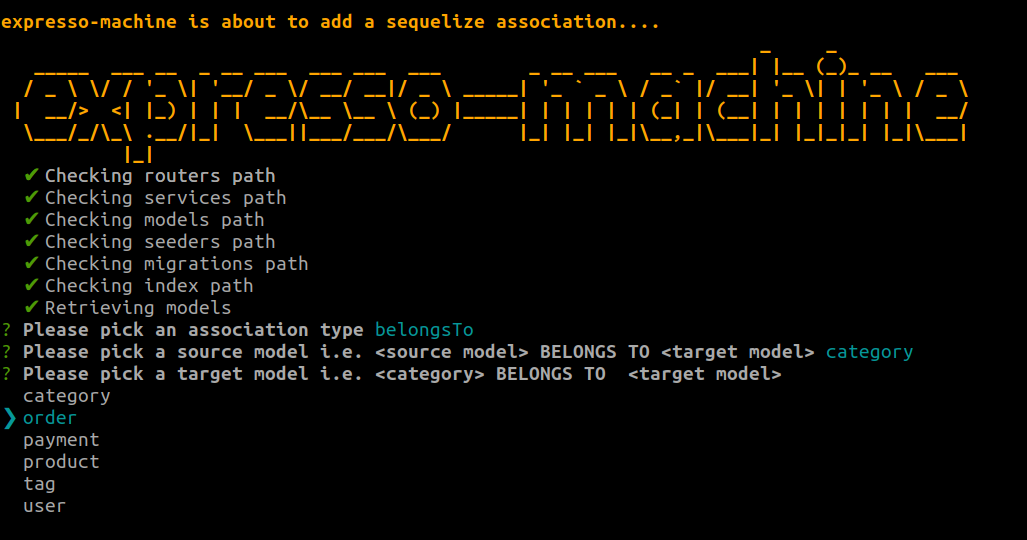expresso-machine v1.5.0
WELCOME TO THE EXPRESSO-MACHINE PROJECT

EXPRESS JS API CLI APPLICATION GENERATOR
ABOUT EXPRESSO-MACHINE
Expresso-machine is a CLI utility to generate an express js app featuring:
- Express application skeleton
- REST API CRUD generation - GET, POST, PUT, DELETE HTTP methods implementation for each API endpoint defined in cli command
- Generation of an initial SEQUELIZE model, migration, seed & configuration files for models defined in cli options
- Dockerfile & docker-compose.yml files generated for out-of-the-box project docker virtualization
- VISUAL CODE configuration for out-of-the-box debugging
- JWT initial implementation for API endpoints protection
- Validation schema initial definition for each RESTFUL endpoint generated
- eslint configuration
- prettier configuration
- 'expresso-machine' (alias 'em') command line interface to generate a brand new application express-app
- 'expresso-machine-add-api-endpoints' (alias 'em-add-api-endpoints') cli to add extra endpoints to an existing project (api implementation, JWT protection and Sequelize models/migration/seeder files)
- 'expresso-machine-add-sq-association' CLI (alias 'em-add-sq-association') to create an extra sql association between tables
- Generation of a number of jest/supertest files within the created app's /test/routers folder
PRE-REQUISITES
As expresso-machine dockerizes the generated expressjs app, it would be beneficial to have the docker and docker-compose cli commands installed in your machine. In windows environents when working with bash I suggest using Window's Power Shell
em-machine CLI ( alias 'em')
GET STARTED
npm install -g expresso-machineThis will install the cli expresso command at global level. Once the installation process completes run the following command:
expresso-machine -hYou should get the following output or similar:
Usage: expresso-machine -i my-app l- product,category
Options:
-V, --version output the version number
-i, --init <projectname> Creates a project named <projectname> (default: "my-app")
-p, --port [port] Set the port the node app is exposed on [port] (default: 3000)
-P, --dbport [dbport] Set the port database is exposed on [dbport] (default: 5433)
-o, --overwrite Overwrite project folder if already existing
-d, --dbDialect [dbDialect] Enter the database [dbDialect] you would like to use: postgres, sqlite, mssql or mysql (default: "postgres")
-l, --list <apiEndpoints> A list of api properties <apiEndpoints>, comma-separated (default: ["product","category"])
-h, --help output usage informationEXAMPLE
At this point you are ready to start generating express js apps! Take a look at the following example command to run:
expresso-machine -i my-app -l dog,cat
This command will create a 'my-app' folder with a ready to run dockerized application. CD into the folder:
cd my-appRun the following command as a background process:
npm run init &This command will run docker-compose build and the overall app. Wait until this process completes in the background. When it does run:
npm run init-dbThis will create a sequelize migration and create the Dog, Cat tables as well as the seeding process to create a record for each table.
The application exposes the following endpoints on default port 3000:
GET localhost:3000/dogs/ (all paginated dogs)
GET localhost:3000/dogs/:id (get a dog with id <:id>)
POST localhost:3000/dogs/ (create a dog, you must include the 'dog' object in the request body)
PUT localhost:3000/dogs/:id (update a dog, you must include the 'dog' object in the request body and 'id' <:id>)
DELETE localhost:3000/dogs/:id (delete dog with 'id' :id)GET localhost:3000/cats/ (all paginated cats)
GET localhost:3000/cats/:id (get a cat with id <:id>)
POST localhost:3000/cats/ (create a cat, you must include the 'cat' object in the request body)
PUT localhost:3000/cats/:id (update a cat, you must include the 'cat' object in the request body and 'id' <:id>)
DELETE localhost:3000/cats/:id (delete cat with 'id' :id)GRAB A JWT TOKEN
Once you seed the db an user is created with the following credentials:
- email: jamesbond@somedomain.com
- password: password
You can use POSTMAN or another REST client to post to the credentials to the /auth/login endpoint. I.e.

Run the request and get the token:

Copy the the token and include it in an authorization header key and hit the GET endpoints to return all 'cats' (i.e. http://localhost:3000/cats) and get a seeded record as generated by expresso-machine:

'expresso-machine-add-api-endpoints' CLI (alias 'em-add-api-endpoints')
When you install expresso-machine another set of CLI command will be made available globally: expresso-machine-add-api-endpoints (alias em-add-api-endpoints) and expresso-machine-add-sq-association (alias em-add-sq-association)
Check it out:
em-add-api-endpoints -hUsage: expresso-machine-add-api-endpoints l- product,category
Options:
-V, --version output the version number
-l, --list <apiEndpoints> A list of api properties <apiEndpoints>, comma-separated (default: [])
-h, --help output usage informationUse this command when you cd into a project folder generated by expresso-machine
cd my-appThen run the expresso-machine-add-api-endpoints command followed by the -l option with a comma-separated list of endpoint domains to add to your project i.e.
expresso-machine-add-api-endpoints -l product,categoryexpresso-machine will generate the following files within the my-app project directory:
./src/routers/route-products.js
./src/routers/route-categories.js
./src/db/models/product.js
./src/db/models/category.js
./src/db/seeders/20190305001941-product-data.js
./src/db/seeders/20190305002041-category-data.js
./src/db/migrations/20190305001941-create-product.js
./src/db/migrations/20190305002041-create-category.js
./index.js
will also be amended so the route will be added to the app.

'expresso-machine-add-sq-association' CLI (alias 'em-add-sq-association')
This very useful command creates migration files on the to create migration files to create association between tables. It does it interactively via the console in a very easy and comprehensive manner.
Just cd in your expresso-machine generated project folder anr run:
expresso-machine-add-sq-associationAnd you'll get the following:

- Basically you will be asked to pick one of the relationship types i.e.:
- belongsTo
- hasOne
- hasMany
- belongsToMany
- To pick a source model/table from the provided list
- To pick a target model/table from the provided list
Expresso-machine will create a brand new sequelize migration file, so to apply it just run:
npm run migrateAnd changes will be applied to the DB.
NPM BUILT-IN COMMANDS IN GENERATED APP
- npm run init - initialize project running
docker-compose build && docker-compose upto install project dependencies and create docker containers and starts them - npm run init-db - short version to run database migrate and seed operations
- npm test - runs jest tests
- npm run test-coverage - produces a jest coverage report
- npm run start - starts application with nodemon
- npm run debug - starts application with nodemon & debugger for VS Studio code
- npm run dockerbuild - runs
docker-compose build - npm run dockerup - runs
docker-compose up - npm run erase-db - runs the
docker exec -it my-app_web_1 ./node_modules/.bin/sequelize db:migrate:undo:allfrom host OS into container and undoes SEQUELIZE migration - npm run migrate - runs the
docker exec -it my-app_web_1 ./node_modules/.bin/sequelize db:migratefrom host OS into container and generates SEQUELIZE migration - npm run seed - runs the
docker exec -it my-app_web_1 ./node_modules/.bin/sequelize db:seed:allfrom host OS into container and performs SEQUELIZE database seed operation - npm run go-into-container - runs the
docker exec -it my-app_web_1 /bin/ashto log into the docker container via shell
NUNJUCKS TEMPLATES
When expresso-machine generates an application it also creates a couple of nunjucks templates in the ./views folder as well as a base template using bootstrap.
JEST/SUPERTEST AUTOMATICALLY GENERATED TEST FILES
Whenever you create a brand new application by running expresso-machine or em and subsequently expresso-machine-add-api-endpoints or alias em-add-api-endpoints a test file for each endpoint domain you created will be generated within the ./test/routers folder of your app.
For example if you run:
em -i my-app -l productA file containing all initial tests for the product endpoint will be generated to ./test/routers/route-product.test.js
RUNNING YOUR TESTS
Get into the docker container by running the command
npm run go-into-containerthen just run
npm testAll jest/supertests will be run in watch mode and re-run whenever file changes are detected
TO DO
* Adding an extra CLI to dynamically add extra routes & templates.